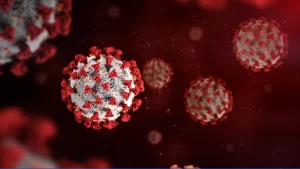Rheumatoid Arthritis and COVID
 Patients with autoimmune rheumatic disease are often treated with medications called DMARDs (disease modifying antirheumatic drugs) that suppress the immune system. DMARDs are necessary to prevent pain, swelling, damage, dysfunction, disability and even death.
The underlying rheumatic condition and the medication to treat it can increase the risk for severe COVID-19. It has become clear that patients with poorly controlled autoimmune disease are more likely to be hospitalized with COVID-19 than patients whose disease is adequately controlled. Overall, we believe the net effect of continuing treatment for rheumatic conditions reduces the risk for severe COVID-19. In other words, the benefit from having a well controlled autoimmune condition, outweighs the negative effects from immunosuppression. Rituximab treatment is likely an exception to this as it has been associated with increased risk for hospitalization and death in patients with COVID-19 (Pathogen Immun. 2021 May 14;6(1):76-103.).
It is important for patients with autoimmune rheumatologic conditions to receive vaccinations appropriate for their age, health, sex, and location. Vaccination against COVID-19 is appropriate to reduce risk of infection and to reduce the severity of any breakthrough infection. There is concern that patients with immunocompromised (such as patients treated with immunosuppressant DMARDs) may have reduced response to COVID-19 vaccination. This is even mentioned in the emergency use authorization for the vaccines. I regularly receive calls from patients asking if the vaccine worked for them and if we should check antibody levels to ensure the vaccine worked. This is a complicated issue.
It is well known that treatment with B cell depleting therapies, such as rituximab, reduces antibody production from vaccines. Recently the CLARITY IBD study demonstrated reduced antibody levels following a single dose of BNT162b2 and ChAdOc1 nCoV-19 SARS-CoV-2 vaccines in patients who were treated with infliximab for Crohn’s disease. Receiving the second dose of the vaccine led to seroconversion in most patients. I am not aware of any published studies showing COVID-19 infection rates and outcomes in patients with rheumatic disease on immunosuppressants. This type of information is what we really need to see in order to truly understand the effectiveness of vaccination in immunocompromised people. I suspect that the effectiveness of the COVID-19 vaccines is mildly reduced in patients with autoimmune disease on immunosuppressants. Some medications may have more of an impact on the effectiveness of the vaccine than others. Based upon our understanding of how various DMARDs work and information available regarding their effects on other vaccines, the American College of Rheumatology has published guidelines on how to manage DMARDs during vaccination. These guidelines can be found at www.rheumatology.org.
The FDA recommends against COVID-19 antibody testing to determine you are immune following vaccination because antibody titers have not been shown to correlate with COVID-19 vaccine efficacy.
In summary, I recommend the following:
Patients with autoimmune rheumatic disease are often treated with medications called DMARDs (disease modifying antirheumatic drugs) that suppress the immune system. DMARDs are necessary to prevent pain, swelling, damage, dysfunction, disability and even death.
The underlying rheumatic condition and the medication to treat it can increase the risk for severe COVID-19. It has become clear that patients with poorly controlled autoimmune disease are more likely to be hospitalized with COVID-19 than patients whose disease is adequately controlled. Overall, we believe the net effect of continuing treatment for rheumatic conditions reduces the risk for severe COVID-19. In other words, the benefit from having a well controlled autoimmune condition, outweighs the negative effects from immunosuppression. Rituximab treatment is likely an exception to this as it has been associated with increased risk for hospitalization and death in patients with COVID-19 (Pathogen Immun. 2021 May 14;6(1):76-103.).
It is important for patients with autoimmune rheumatologic conditions to receive vaccinations appropriate for their age, health, sex, and location. Vaccination against COVID-19 is appropriate to reduce risk of infection and to reduce the severity of any breakthrough infection. There is concern that patients with immunocompromised (such as patients treated with immunosuppressant DMARDs) may have reduced response to COVID-19 vaccination. This is even mentioned in the emergency use authorization for the vaccines. I regularly receive calls from patients asking if the vaccine worked for them and if we should check antibody levels to ensure the vaccine worked. This is a complicated issue.
It is well known that treatment with B cell depleting therapies, such as rituximab, reduces antibody production from vaccines. Recently the CLARITY IBD study demonstrated reduced antibody levels following a single dose of BNT162b2 and ChAdOc1 nCoV-19 SARS-CoV-2 vaccines in patients who were treated with infliximab for Crohn’s disease. Receiving the second dose of the vaccine led to seroconversion in most patients. I am not aware of any published studies showing COVID-19 infection rates and outcomes in patients with rheumatic disease on immunosuppressants. This type of information is what we really need to see in order to truly understand the effectiveness of vaccination in immunocompromised people. I suspect that the effectiveness of the COVID-19 vaccines is mildly reduced in patients with autoimmune disease on immunosuppressants. Some medications may have more of an impact on the effectiveness of the vaccine than others. Based upon our understanding of how various DMARDs work and information available regarding their effects on other vaccines, the American College of Rheumatology has published guidelines on how to manage DMARDs during vaccination. These guidelines can be found at www.rheumatology.org.
The FDA recommends against COVID-19 antibody testing to determine you are immune following vaccination because antibody titers have not been shown to correlate with COVID-19 vaccine efficacy.
In summary, I recommend the following:
- COVID-19 vaccination for my patients with autoimmune conditions on DMARDs
- American College of Rheumatology’s Guidelines regarding timing of various DMARDs around vaccination
- Avoid routine antibody testing after vaccination to assess response to the vaccine
- Assume mildly reduced efficacy of vaccination for immunocompromised patients and continue to avoid high risk activities (such as large indoor crowds)
